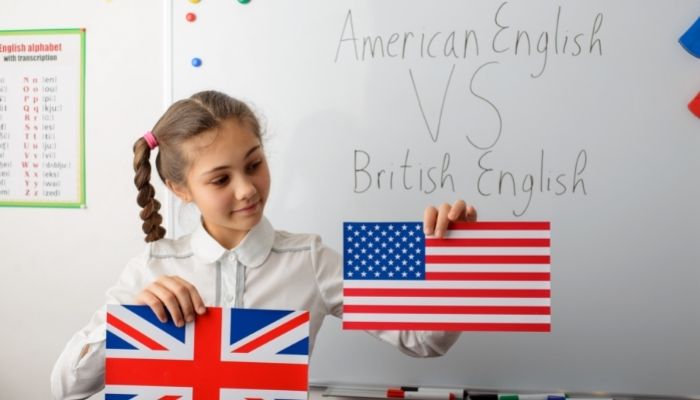Great site to keep my english skills updated for work and travel. I am really enjoying the lessons!
Maria C
 Argentine
Argentine


Il est difficile de croire que “g’day mate”, “you alright?”, ou “how’s it going?” sont toutes des salutations différentes en anglais pour dire “hello” ou demander comment va quelqu'un.
De nombreux apprenants de langue anglaise trouvent difficile de comprendre la différence entre l'anglais britannique, australien et américain (des États-Unis). Cependant, il est important de se rappeler que ce sont trois variétés d'anglais qui sont plus similaires que différentes. Ces différences peuvent aider à pimenter votre expérience d'apprentissage de l'anglais !
*Veuillez noter : lorsque vous faites référence à « l'anglais américain », il s'agit spécifiquement de l'anglais parlé aux États-Unis
DIFFÉRENCE MAJEURE ENTRE LES TROIS TYPES D'ANGLAIS:
La différence la plus évidente entre l'anglais britannique, australien et américain réside dans l'accent (ou la prononciation), en particulier avec les voyelles.
Par exemple, l'anglais américain utilise un son "r" clair (en particulier à la fin des mots) et l'anglais australien et britannique ne prononce pas un son /r/ clair (en particulier la fin d'un mot ou d'une syllabe). En Australie ou en Grande-Bretagne, le mot "car" serait prononcé sans le son "r" final (c'est-à-dire "ca") et "warmer" serait prononcé sans le son "r" du milieu (c'est-à-dire /wamer/).
Une autre différence majeure entre l'anglais américain et l'anglais britannique ou australien est l'intonation lorsque l'on pose des questions. La voix monte à la fin d'une question oui ou non avec l'anglais américain, mais avec l'anglais australien et britannique, la voix baisse.
Il existe également une différence majeure entre le vocabulaire et l'orthographe avec les trois types d'anglais différents. Par exemple, aux États-Unis et en Grande-Bretagne, ils appellent deux morceaux de pain avec une protéine ou un légume au milieu un “sandwich” et en Australie, ils appellent cela un “sanga”.
Vous trouverez ci-dessous une liste de phrases ou de mots populaires couramment utilisés dans ces trois pays anglophones différents.
ANGLAIS AUSTRALIEN :
“Aussie” fait référence à quelqu'un qui est australien.
“Mate” signifie ami (« mate » est également utilisé en anglais britannique).
“G’day” (pronounced “geh-day”) means “hello” or “how’re you?” (prononcé « geh-day ») signifie “hello” ou “how’re you?”
“Crikey!” ou “Streuth!” (prononcé « krai-kee » et « strooth ») sont à la fois des exclamations de stupeur, de choc ou de surprise.
“How ya going?” signifie “how’re you?”
“Fair dinkum” ou “dinky die” sont tous deux utilisés pour dire que quelque chose est vrai.
“True Blue” est une façon de dire "the real thing". À l'origine, cela signifiait être patriotique, mais aujourd'hui, cela signifie authentique ou authentiquement australien.
BRITISH ENGLISH:
“Bloody” signifie "very". C'est un excellent moyen de montrer de l'emphase lorsque vous parlez.
“Rubbish” signifie littéralement “garbage” ou “trash”. Si vous n'aimez pas quelque chose, c'est le mot parfait à utiliser pour dire que c'est sans valeur ou faux.
“Lovely” est un mot britannique courant à utiliser si vous voulez exprimer de l'affection ou de l'approbation pour quelqu'un ou quelque chose (couramment utilisé parmi la génération plus âgée, en particulier les femmes).
“Pissed” signifie que quelqu'un a bu une grande quantité d'alcool et est en état d'ébriété ou ivre (à ne pas confondre avec l'anglais américain qui utilise ce mot pour dire que quelqu'un est extrêmement en colère ou irrité).
“Bodge” est un mot utilisé pour dire qu'un travail de réparation est de mauvaise qualité ou n'est pas bien fait.
“Chuffed to bits” est une façon courante en Grande-Bretagne de dire que vous êtes très satisfait de quelqu'un ou de quelque chose.
“Cheeky” signifie ludique ou espiègle.
“You alright?” ou “alright?” est une façon courante de dire “hello!” en Grande-Bretagne. Vous pouvez simplement répondre en hochant la tête ou en disant “Hi”. Cela ressemble à une question, mais c'est simplement une salutation.
“Fancy a cuppa’?” signifie “would you like a cup of tea?” Comme beaucoup de gens le savent déjà, le thé fait partie intégrante de la culture britannique et il est très courant de se voir offrir une tasse de thé si vous rendez visite à un ami britannique.
ANGLAIS AMÉRICAIN:
“How’s it going?” ou “what’s up?” est une façon courante pour les Américains de demander “how’re you?” ou “how’re you doing?”
“Awesome” or “cool” sont des moyens populaires d'exprimer que vous pensez que quelqu'un ou quelque chose est incroyable ou merveilleux.
“Costs an arm and a leg” signifie que quelque chose est vraiment cher.
“Oh my God”, “oh my gosh” ou “OMG” sont autant de manières de souligner la surprise ou le choc.
“Hang out” est une façon de parler de passer du temps à un certain endroit ou avec quelqu'un.
“Chill out” signifie se détendre.
“Have a blast” est une façon de dire que quelqu'un ou quelque chose est amusant.
Vérifiez votre score - Essayez notre quiz d'anglais gratuit + Obtenez un bonus gratuit